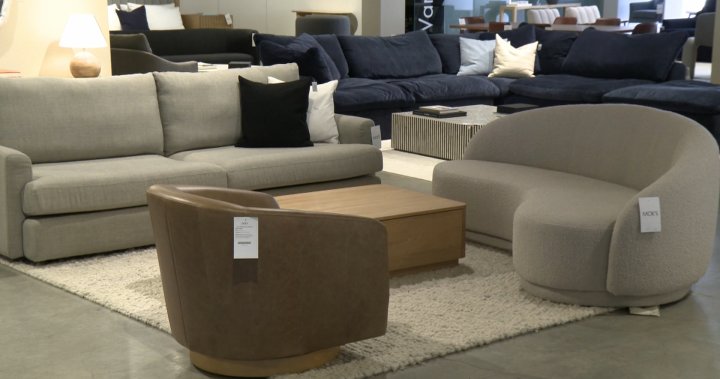A potential spike in tariffs for upholstery isn’t sitting well with B.C. furniture retailers and could make consumers uncomfortable.
The Canadian Home Furnishings Alliance (CHFA) has distributed a letter saying it has sent a complaint to the Canadian Border Services Agency (CBSA) asking it to investigate and slap higher import tariffs on fabric upholstery and seating, like sofas and chairs, from countries like China and Vietnam.
“The total Canadian Fabric Stationary Domestic Seating (FSDS) market is estimated to have grown by approximately 39 per cent from 2019 to 2022,” the CHFA letter reads.
“In 2022, China and Vietnam surpassed Canadian producers as the biggest source of FSDS in Canada. Coupled with a significant increase in imports from other sources, Canadian producers’ share of this growing market fell by 11 per cent.”
It wants CBSA to investigate whether these countries have been unfairly pricing their goods to undercut Canadian manufacturers.
Exporting a product at a price that is lower than it would sell in the exporter’s domestic market is known as dumping under the Special Import Measures Act (SIMA). One of the CBSA’s tools to discourage dumping is higher tariffs.
Get the latest National news.
Sent to your email, every day.
Two years ago, the federal government brought in new tariffs which were as high as 295 per cent on leather upholstery and recliners from China and Vietnam.
However, local retailers say more tariffs could spell disaster for their businesses and for consumer prices.
At Moe’s Home Collection in Vancouver, most of their furniture is imported from China and Vietnam. Owner Sara Samieian says she fears any potential tariffs could be as high or higher than the ones imposed two years ago.
“It would mean that we cannot import from those countries anymore,” she said. “So that would mean a lot less selection and options when it comes to living room furniture in Canada.”
She says she would have to look at other markets, including Mexico and Eastern Europe and estimates Canadians could see store prices increase by 25 to 50 per cent.
“I think this happening because there’s a couple of domestic manufacturers in Canada who are maybe feeling the economic difficulties right now and this is a way for them to get more business.”
However, DIG360 retail adviser Rick Bohonis isn’t sounding alarm bells just yet. He says the economic situation in Canada is very different from two years ago, and the government may not decide to pursue tariffs.
“I think there’s a lot of inflationary pressure that would definitely concern governing bodies,” he said. “Inflation will play a big role into this. Where last time that the tariffs were applied, inflation wasn’t a concern.”
He says if tariffs were to be implemented, consumers would most likely bear the brunt of the increase, but they might not see the impacts for a year or two.
“When you’re purchasing product from overseas, you’re not really going to see it for at the very earliest six months, eight months, sometimes a year if you’re buying ahead.”
CBSA does not publicize the receipt of a complaint but does post on its website when an investigation is launched. So far, no investigation into fabric upholstery and seating from China and Vietnam has been initiated.
“In regards to the dumping and subsidizing of upholstered domestic seating from China, it is already subject to a CBSA measure in force,” a CBSA statement to Global News reads. “This measure was put in place as a result of an investigation initiated on December 21, 2020.”
Should BCSA launch an investigation, it would make preliminary decisions within 90 days, including provisional duties.


